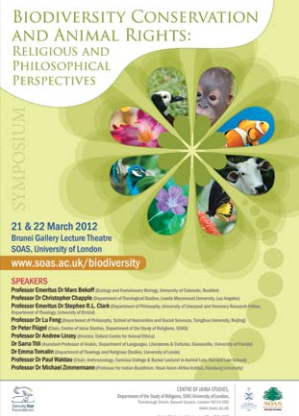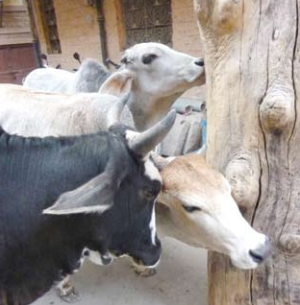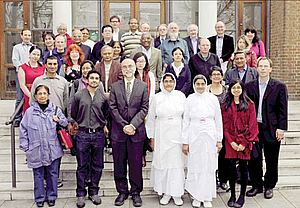
Centre of Jaina Studies Newsletter: SOAS - University of London
The title of the March 2012 conference 'Biodiversity Conservation and Animal Rights Religious and Philosophical Perspectives' says a lot about the breadth and scope of this crucial and sensitive subject. It is quite appropriate that this interdisciplinary event was hosted by the Centre for Jaina Studies at SOAS, as of all the religions, the Jaina tradition has had the most to say about this issue and has always had a deep reverence for animal life.
The keynote speaker was the author and film-maker Michael Tobias of the Dancing Star Foundation. His subject 'Mahavira, Don Quixote and a Brief History of Ecological Idealism' aimed to explore Jainism as a profound philosophical framework for compassion towards animals. Tobias critiqued the notion of anthropocentrism, espousing the Jaina view that each living being is endowed with a soul and therefore sentient. Tobias argued that the philosophy requires each one of us to be an ambassador for non-violence. Evolution does not condemn us, but our choices do. Parasparopagraho Jivanam all living beings are interdependent is a profound scientific truth which humanity has failed to recognise for thousands of years, to its detriment.
The next morning, the conference was opened by Christopher Chapple (Loyola Marymount University). Chapple focussed on animal stories in the Indic traditions, drawing on four narratives from the Panchatantra, the Jatakas and the Jaina canons. These stories illustrate the great wisdom and spiritual life which animals have, and also concepts of family life and duty, and how going into the wilderness and monasticism help people reconnect with their own truth. These stories move the human soul, and cause people to change their own story.
Mark Bekoff (University of Colorado) explained how science has shown that animals experience a wide range of emotions and care very much about what happens to them. We need 'compassionate conservation' and must recognise that animals are not property and we cannot and do not own them. Speciesism is a big problem. Bekoff called for a global moral imperative to 'do no harm'. How can humans say that they love animals except for the ones they eat? Humanity needs to move out of its comfort zone and expand its compassionate footprint.
Paul Waldau (Canisius College) argued that selfserving thinking and anthropocentrism are dangerous. We live in a multi-species world, and must face the limits of our own understanding about animals. It is very important to keep balance in Animal Studies, which is increasingly popular among students, with subjects such as anthrozoology, human-animal studies and animal humanities. It is an inter-disciplinary mega-field drawing from disciplines as diverse as history, religious studies, law, ecology, ethology and critical studies. Humans should recognise their 'animality', and need to speak very carefully about other living beings. He quoted Thomas Berry ' the world is not a collection of objects but a communion of subjects.' Humility, honesty and communality are the values through which we should approach animal welfare problems.

Lu Feng (Tsinghua University, Beijing) used cultural analysis to explain modern ecological damage. In Ancient China, there was great respect for scholars who were empathetic to nature, for example Confucious, who was pro-environment. However since the 1850s, modernity has been a strong ideology in China. Intellectuals stood firmly against ancient traditions and customs and were strongly in favour of modernity and its resulting exploitation of animals and the environment. This behaviour is clearly unsustainable. Lu Feng explained that recently there has been an official shift towards a more caring 'eco-civilisation' approach, but there is no consensus about what this means. He then proceeded to present his model of what eco-civilisation could look like in China.
Emma Tomalin (Leeds University) examined the impact of religious discourses about the environment, assessing whether these influences really contributed to sustainable development or whether they are overromanticised. She found that there is a difference between eco-theology and lived practice. There is a sense of an elite bourgeois environmentalism, and male domination of religious activity and discourse a gender issue. Tomalin analysed the 'Sacred Groves' project as a way of engaging religious communities in nature preservation, and found that religious values in themselves did not influence the project. Instead, religion was being used for scientific conservation. Tomalin felt that religion has a role to play in conservation, but should not be taken over by outsiders imposing their own agendas. Careful engagement with local communities is recommended.
Sarra Tlili (University of Florida) analysed Muslim attitudes toward animals in the past and the present. She found that, in general, traditionally compassionate and caring attitudes have been declining in recent centuries. This change is explained by the rise of modernity and the shift in human ethics. Colonisation suppressed old traditions. There was also an accompanying shift in the pre-modern literature: humans were no longer situated within the animal world. In Islamic doctrine there was a perception that 'eating animals for food is permitted by God and Humans are on top of nature and assigned to care for it.' These attitudes broke the traditional kinship with non-human animals which was originally emphasised by the Shafii School of Law.
Tlili further argued that in future, there should be more engagement of scholars with animal welfare issues, and more exposure to Islamic scriptures about animals. Religious scholars have a lot of influence on the community, and engaging them in deeper discussions about animals might result in more creative and sensitive approaches to traditional texts in the search for solutions to modern challenges. Animals would certainly benefit from the reestablishment of governmental and social institutions to oversee their treatment.
Andrew Linzey (Oxford Centre for Animal Ethics) analysed the role of Christianity in animal welfare. The dominant voices have been mainly negative. For example, Aquinas thought that animals were devoid of reason. Animals did not have rational souls and were not sentient, and therefore did not have any rights. They had no status and the language used described them as beasts, brutes and dumb animals. The feeling was that only humans mattered; the human species was deified. However, careful study of Genesis shows that dominion means that we are divinely commissioned to look after the world as God intended, including care of animals. Linzey argued that we need to re-envision ourselves not as the master species but as the servant species. He stated that 'all sentient creatures can be seen to have rights because their Creator has rights to see what is created is treated with respect.' Maybe there should be a Jesus ethics, based on a paradigm of inclusive moral generosity towards those who are poor, marginalised and vulnerable (which would include animals). The implications of this theology are living free of violence and cruelty, vegetarianism, and intensive farming.
Stephen R.L. Clark's (University of Liverpool) presentation 'Imaging the divine: how is humanity the reason for creation, and what is humanity?' addressed the problem of the impact of Christianity on human-animal relations, and reflected also on innate human limitations in a somewhat pessimistic philosophical note on the possible impact of the animal protection movement.
Michael Zimmerman (University of Hamburg) focussed on Buddhism, and explained that in most of Asia, Buddhists are fond of eating meat, and Buddhist organisations do very little to protect animals from cruel stock breeding. They also do not object to murderous long distance transportation of livestock, or slaughterhouses. The preservation of biodiversity has hardly entered the agenda of Buddhist organisations even though philosophically, animals are equal to humans. The golden rule is that one should not treat other sentient beings in a way that one would not like to be treated. In Buddhist philosophy, to be born as an animal is a karmic punishment there is no practice of dharma in the animal kingdom, no righteousness. Monks are allowed to eat meat as long as an animal has not been killed specifically for them. He showed pictures of a sacred ceremony in Thailand where caught fish were released back into the water and yet in the same community, the menu for lunch offered to monks included meat. Killing is a negatively charged karmic act, but consumption of meat has no karmic effect these were the serious contradictions in the theology and practice.

In 'Rethinking Animism The Jaina Doctrine of NonViolence from the Perspective of Comparative Ethics', Peter Flügel (SOAS) elucidated the Jaina theory, and its dualist distinction between jiva and ajiva soul and nonsoul, where plants, animals, humans and the five elements are classed as living, endowed with consciousness and will-power. In Flügel's view, the Jaina approach to the environment is self-interested. Non-violence and the protection of life is necessary for individual salvation, because violence to any living being attracts karmic particles, with adverse consequences for the future of the soul. Classical Jainism is not interested in the protection of the environment per se, he argued. Flügel then went on to explore the extent to which the Jaina philosophy of ahimsa could serve as the foundation for a universal ethic for animal welfare and protection.
At the end of the presentations there was a panel discussion which explored issues of environmental and social justice, activism using social media, and other practical methods of improving animal welfare. It was argued that humanity has become far too comfortable in recent decades, and we are now about to return to the hard life of the past, as the antibiotic war against bacteria is failing, and the ecosystem is being paralysed. Overall, it was a very good conference with a wide range of speakers and a breadth of topics. Non-human animals were not there to speak for themselves, but the proxies did try to capture their feelings and emotions by centring their thinking away from the traditional anthropocentric bias and instead drawing on traditional wisdoms. This task is never easy as we are restricted by human language and frames of thinking and investigation. Given the huge plurality of views and research, the conference did not reach any conclusion about animal rights. But it definitely heightened the awareness and sensitivity to various philosophical and religious perspectives. Irrespective of debates and dialogues, the fundamental fact is that animals should not be made to suffer.
Dr Atul K. Shah was founding editor of Jain Spirit magazine and now serves as Director of Diverse Ethics (www.diverseethics.com), a consultancy specialising in helping leaders and organisations leverage the strengths of a diverse workforce.

 Dr. Atul K. Shah
Dr. Atul K. Shah